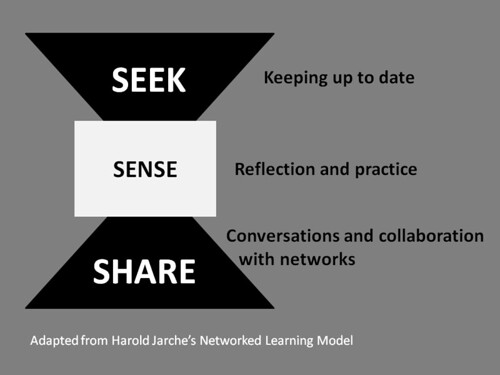
For 2011, my three words are: Seek, Sense, and Share inspired by Harold Jarche’s model for networked learning.
How these words will guide me in 2011:
Seek: Seeking is the process of keeping up to date in your field. Over the past decade, the Internet and social media have been one of my primary sources for professional learning. To me, seeking represents the topics or content that I’m curious about and that will help me be more effective at my work as a social media and nonprofit capacity builder and trainer – and blogger. Some topics of interest for me include: social media measurement, ROI, networked learning, information overload and mindfulness, Civil Society 2.0, networks, training and capacity building approaches, and culture change. That means I’ll continue to build my personal networks and content sources in these areas. As far as geekery topics, I’m particularly excited to explore some of the new tools for coping with the ever expanding information on social networks and mobile.
Sense: Sensing is making sense of the information. This is building time in for reflection and putting I find out into practice. Sense making is also experimenting and learning by doing. It is also a process that happens, in part, in quiet – and for me that means embracing slowness. Most of all, I want to master the ability to switch between connectedness and solitude. I will continue to practice and explore different ways to use visuals to aid reflection, including data visualization, visual thinking, structured frameworks, graphic facilitation, and more. Most of all, sensing requires discipline, a routine, systems, and being organized.
A lot the products of my sense-making are shared through this blog, flickr, YouTube, and Slideshare – as well as offline through presentations, book and article writing, and facilitating workshops.
Share: This is the process of exchanging resources, ideas and experiences with our networks and collaborating with our colleagues. I participate in numerous online communities of practice, but I’m most excited about the Zoetica Salon that we’ve been hosting on my Facebook page and we will continue with a monthly theme and share the summaries. I’m also exploring different networks for sharing and connecting with colleagues that go a little bit deeper than 140 characters. Lately, I’ve found Quora to be an interesting place for discussions.
Last week, I was noodling around with the idea of professional learning in a connected age: How professionals learn using social networking tools to improve their effectiveness at work. Before the Internet and Facebook, it used to be called professional development. Mixing in social media, the practice has been called developing “personal learning network,” but some, like Harold Jarche, are calling it “networked learning.”
I have been reflecting on my system for doing this – looking at the tension between curating one’s network and get things done, but leaving room for serendipity. Harold Jarche linked to me in his post on 2010 social media and education trends which lead to his very good post about networked learning that helped me crystallize my three words. He talks about the growing importance of informal learning in the connected workplace as well as the importance of sense-making skills, both individually and in networks, as new digital literacy skills.
Jarche defines networked learning as “an individual, disciplined process by which we make sense of information, observations and ideas.” He further suggests that networked learning is the solution (in part) to information overload (not the cause!). For networked learning to be beneficial, it requires an open attitude toward learning and finding new things. In addition, each person needs to develop individualized processes of filing, classifying and annotating digital information for later retrieval. His conceptual model include the three words: seek, sense, and share.
My sense is that becoming a master at networked learning helps you improve what you are doing in world that is changing so fast and is so complex.
What role will social media and connectedness play in your quest to improve your professional work?
Beth Kanter is a consultant, author, influencer. virtual trainer & nonprofit innovator in digital transformation & workplace wellbeing.
